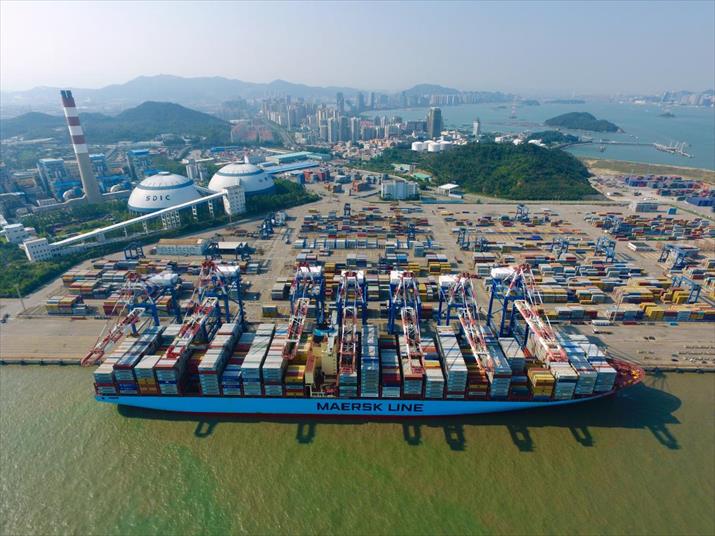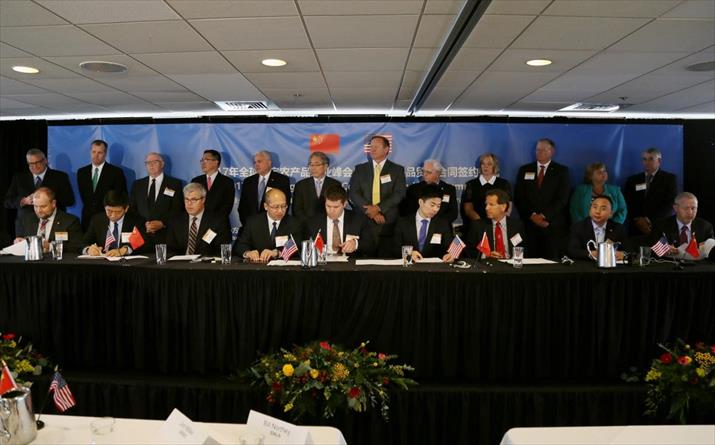| Opinion |
| Is a Trade War on the Way? | |
| U.S. launches trade investigation against China regardless of WTO rules | |
|
|
 A cargo ship unloads at a port in Xiamen, Fujian Province (XINHUA)
Section 301, once heavily used in the 1980s and early 1990s, allows the U.S. president to unilaterally impose tariffs or other trade restrictions on foreign countries. But the United States has rarely used the trade tool since the World Trade Organization (WTO) came into being. "The U.S. side should keep its promise and not become a destroyer of multilateral rules," China's Ministry of Commerce (MOFCOM) said in a statement, reminding the world's largest economy to treasure the currently sound Sino-U.S. economic and trade ties and cooperation momentum. "If the U.S. side fails to respect basic facts and multilateral trade rules and takes measures that harm bilateral economic and trade relations, China will definitely not sit by, but take all appropriate measures to resolutely safeguard its legitimate rights and interests," the statement said.  Nearly 100 officials and enterprise representatives from China and the United States attend the signing ceremony of agricultural deals held in Des Moines, Iowa, on July 14, 2017. Some 20-odd Chinese and U.S. enterprises signed agricultural transaction contracts worth $5.012 billion, under which Chinese enterprises will import 12.53 million tons of soybean and 371 tons of pork and beef from the U.S. companies. (XINHUA)
Will it work? Apparently, the United States is attempting to help its domestic industries gain more advantages in international markets by oppressing its major rival, which to some extent, is understandable. Yet, from the perspective of economic theory, it's really confusing what the United States aims to achieve by carrying out Section 301 investigations against China regardless of WTO rules. Will the United States manage to narrow its trade deficit with China by waging a trade war? Of course not. Anyone with some macroeconomic sense would know a country's current account balance is determined by the balance of its national savings and investment, and a trade deficit can be reduced only by increasing the saving rate through reforming social welfare and labor union systems, increasing the employment rate and restraining expenditure on military and foreign affairs. If those reforms can't be achieved within a short period of time, the United States should seriously consider loosening its heavy export controls on China, rather than reducing imports of made-in-China products, if it attempts to reduce its trade deficit with China in the short run. Will stricter intellectual property rules help the United States undermine China's competitiveness? Of course not. China's research and development personnel soared from 671,000 in 1991 to 3.85 million in 2016. The new science and engineering graduates are among the world's best. Chinese telecom equipment makers Huawei and ZTE are now among the top three organizations with most international patents. Within the United States itself, Chinese hi-tech professionals have a large presence. In fact, many American enterprises leading in scientific and technological innovation have complained that the over-strict intellectual property protection implemented by the U.S. Government has become a stumbling block for innovation. Many enterprises have fled the country to avoid being dragged down by rampant infringement cases. Will a trade war between the two countries hamper China's upward trend? Reviewing history, we find the answer is an emphatic "no!" Since 1989, the United States has employed Section 301 to restrain China. However, things have gone contrary to its wishes. Though the U.S. Government's decision to officially launch Section 301 investigation against China has been heavily covered by both domestic and foreign media, few people in China's economic circles have really taken it to heart. They have got used to the frequent employment of Section 301 by the United States in the past three decades; China's economy and export volume have not been affected. Instead, leapfrog progress has been achieved. Today, the old equation of strength between the two countries has dramatically changed. According to IMF data, from 1989 to 2016, the ratio of U.S. GDP against China's GDP declined from 11.39 to 1.63. More importantly, in 2016, China surpassed the U.S. in GDP based on purchasing power parity (PPP)—$21.27 trillion compared with $18.56 trillion. In percentage terms, the United States' PPP-based GDP was about 87 percent of China's. On the foreign trade front, China's foreign trade structure used to be unbalanced. To be more specific, a large percentage of its exports were primary products and imports mainly comprised manufactured goods. When the United States launched investigations into Chinese companies based on Section 301 in 1990, China's exports of manufactured products exceeded its imports of such products for the first time, with the overall trade balance turning from a deficit of $24.4 billion to a surplus of $41.2 billion. From then on, China has had a trade surplus every year, with the sole exception of 1993, and has gradually grown into the largest exporter of manufactured goods and the largest importer of primary products. Apart from having a balanced import-export structure and a positive trade balance, China surpassed the United States to become the largest manufacturing and exporting nation with the most foreign exchange reserves in the world and the only country with the complete set of industrial categories set by the United Nations. It seems that over the past three decades Section 301 investigations have hardly hampered China's economic development. The real intention If none of these goals can be achieved by Section 301 investigations, then what's the real intention behind launching such investigations? Less than a week after Trump's swearing-in ceremony, he trademarked his 2020 campaign slogan "Keep America Great," with no intention of hiding his ambition to seek reelection in 2020. However, facing constraints imposed by opponents on every possible front, his healthcare and fiscal reform bills failed to get passed in the U.S. Congress; he had to change his original diplomatic strategy and sign sanctions against Russia; and he has to tolerate constant smearing by mainstream media every day. Mired in difficulties, he very much needs to demonstrate to U.S. voters and supporters that he is sparing no effort to explore overseas markets for U.S. businesses and create job opportunities for U.S. citizens. To this end, what could be more effective than being hawkish toward China? Who would really care about the actual results of such a "performance?" While Section 301 investigations couldn't hurt China at all, the U.S. political system has trapped both Trump, who wants to take some practical measures, and U.S. citizens, who want the government to achieve some practical results. Copyedited by Chris Surtees Comments to zhouxiaoyan@bjreview.com |
|
||||||||||||||||||||||||||||
|
